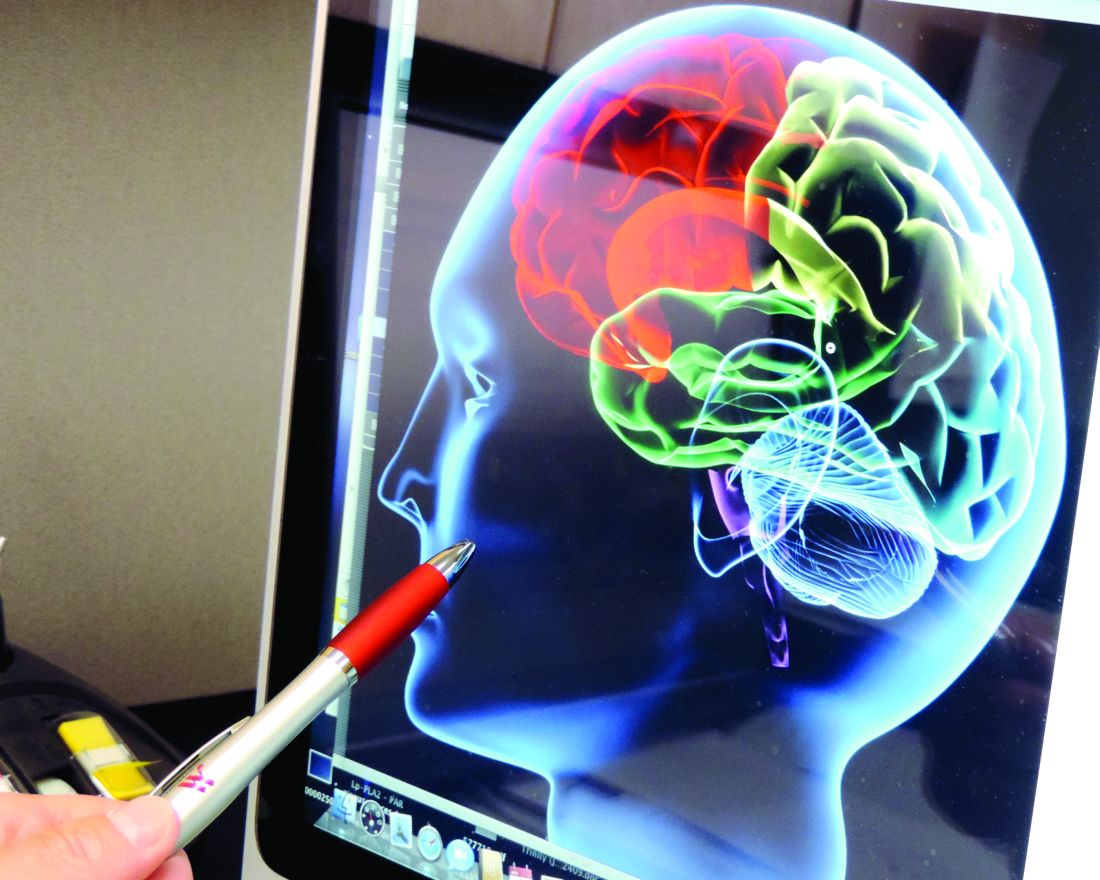User login
Unchecked hypertension has “devastating” long-term implications for cognitive health, the American Heart Association concluded in a scientific statement.
“Hypertension disrupts the structure and function of cerebral blood vessels, leads to ischemic damage of white matter regions critical for cognitive function, and may promote Alzheimer pathology,” Costantino Iadecola, MD, of Weill Medical College of Cornell University, wrote online with his associates in Hypertension. There is especially strong evidence that hypertension in middle age leads to cognitive dysfunction later in life, although “the cognitive impact of late-life hypertension is less clear,” they said.
The AHA statement summarizes the current evidence on hypertension, cognitive impairment, and the cognitive effects of hypertension therapy. Observational studies linked hypertension to cumulative cerebrovascular damage over the course of life, but clinical trials did not clearly show that antihypertensive drugs can prevent or reverse cognitive decline, the authors reported. In lieu of making evidence-based recommendations, they emphasized “personalized treatment of hypertension, taking into account age, sex, APOE [apolipoprotein E] genotype, metabolic traits, [and] comorbidities” (Hypertension. 2016 Oct 10. doi: 10.1161/HYP.0000000000000053).
The authors wrote on behalf of the American Heart Association Councils on Hypertension, Clinical Cardiology, Cardiovascular Disease in the Young, Cardiovascular and Stroke Nursing, and Quality of Care and Outcomes Research, and Stroke. Dr. Iadecola and nine coauthors had no relevant financial disclosures. The remaining three coauthors disclosed research funding from the National Institutes of Health, Lilly, TauRX, and Biogen, and one of these coauthors also disclosed consulting or advisory board work for Lundbeck Pharmaceuticals and the Dominantly Inherited Alzheimer Network Trials Unit.
Unchecked hypertension has “devastating” long-term implications for cognitive health, the American Heart Association concluded in a scientific statement.
“Hypertension disrupts the structure and function of cerebral blood vessels, leads to ischemic damage of white matter regions critical for cognitive function, and may promote Alzheimer pathology,” Costantino Iadecola, MD, of Weill Medical College of Cornell University, wrote online with his associates in Hypertension. There is especially strong evidence that hypertension in middle age leads to cognitive dysfunction later in life, although “the cognitive impact of late-life hypertension is less clear,” they said.
The AHA statement summarizes the current evidence on hypertension, cognitive impairment, and the cognitive effects of hypertension therapy. Observational studies linked hypertension to cumulative cerebrovascular damage over the course of life, but clinical trials did not clearly show that antihypertensive drugs can prevent or reverse cognitive decline, the authors reported. In lieu of making evidence-based recommendations, they emphasized “personalized treatment of hypertension, taking into account age, sex, APOE [apolipoprotein E] genotype, metabolic traits, [and] comorbidities” (Hypertension. 2016 Oct 10. doi: 10.1161/HYP.0000000000000053).
The authors wrote on behalf of the American Heart Association Councils on Hypertension, Clinical Cardiology, Cardiovascular Disease in the Young, Cardiovascular and Stroke Nursing, and Quality of Care and Outcomes Research, and Stroke. Dr. Iadecola and nine coauthors had no relevant financial disclosures. The remaining three coauthors disclosed research funding from the National Institutes of Health, Lilly, TauRX, and Biogen, and one of these coauthors also disclosed consulting or advisory board work for Lundbeck Pharmaceuticals and the Dominantly Inherited Alzheimer Network Trials Unit.
Unchecked hypertension has “devastating” long-term implications for cognitive health, the American Heart Association concluded in a scientific statement.
“Hypertension disrupts the structure and function of cerebral blood vessels, leads to ischemic damage of white matter regions critical for cognitive function, and may promote Alzheimer pathology,” Costantino Iadecola, MD, of Weill Medical College of Cornell University, wrote online with his associates in Hypertension. There is especially strong evidence that hypertension in middle age leads to cognitive dysfunction later in life, although “the cognitive impact of late-life hypertension is less clear,” they said.
The AHA statement summarizes the current evidence on hypertension, cognitive impairment, and the cognitive effects of hypertension therapy. Observational studies linked hypertension to cumulative cerebrovascular damage over the course of life, but clinical trials did not clearly show that antihypertensive drugs can prevent or reverse cognitive decline, the authors reported. In lieu of making evidence-based recommendations, they emphasized “personalized treatment of hypertension, taking into account age, sex, APOE [apolipoprotein E] genotype, metabolic traits, [and] comorbidities” (Hypertension. 2016 Oct 10. doi: 10.1161/HYP.0000000000000053).
The authors wrote on behalf of the American Heart Association Councils on Hypertension, Clinical Cardiology, Cardiovascular Disease in the Young, Cardiovascular and Stroke Nursing, and Quality of Care and Outcomes Research, and Stroke. Dr. Iadecola and nine coauthors had no relevant financial disclosures. The remaining three coauthors disclosed research funding from the National Institutes of Health, Lilly, TauRX, and Biogen, and one of these coauthors also disclosed consulting or advisory board work for Lundbeck Pharmaceuticals and the Dominantly Inherited Alzheimer Network Trials Unit.

